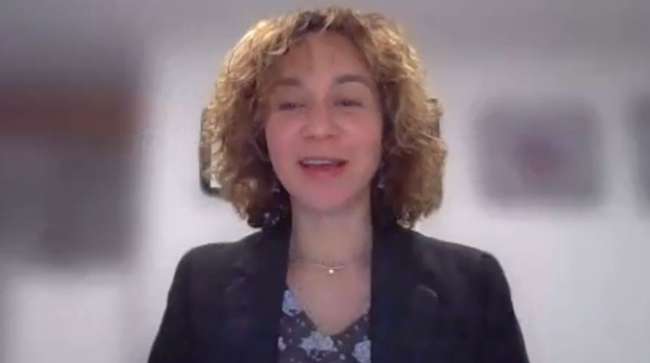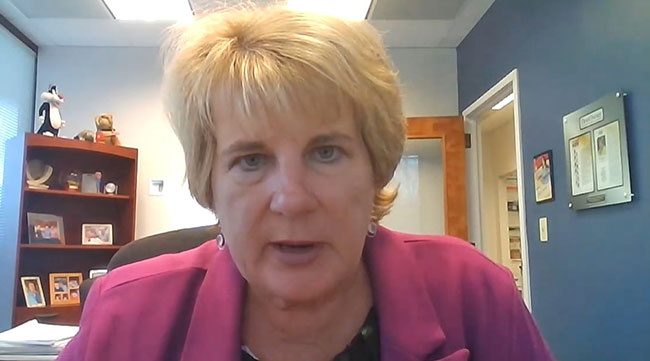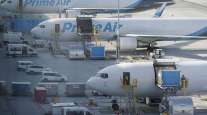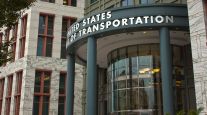Staff Reporter
Automation to Have Extreme Impact on Workforce, FMCSA’s Meera Joshi Says

[Stay on top of transportation news: Get TTNews in your inbox.]
Understanding the impacts of automation on people’s lives and preparing members of the workforce who may be affected by such technologies were priorities highlighted by Federal Motor Carrier Safety Administration acting Administrator Meera Joshi.
Joshi, who previously was commissioner of the New York City Taxi and Limousine Commission, spoke at FMCSA’s 20th annual Analysis, Research and Technology Forum, held virtually March 10. FMCSA’s Office of Analysis, Research and Technology aims to reduce the number and severity of truck crashes by providing data that contributes to further scientific understanding and supporting the deployment of safety technologies.
Noting the “extremely real and broad impacts” of automation, Joshi stressed the importance of preparing the transportation workforce for these systems. She suggested preparatory measures such as training opportunities and consideration of additional jobs that can be created through automation.
“There’s a huge workforce that today travels all across the nation and performs the duties of a professional driver, and it’s been a mainstay of American employment for quite a long time,” Joshi said. “Nothing will happen overnight, but automated vehicles will certainly make inroads into that workforce. What we can’t argue about is that this is a reality. There will be a major shift in workforce.”

Riddle
Analyzing data and technologies were key aspects of the priorities outlined by FMCSA officials during the event. Kenneth Riddle, acting director of FMCSA’s Office of Analysis, Research and Technology, said one priority project of the office’s Analysis Division is identifying high-risk fatal crash corridors. Riddle said the office plans to investigate fatal crashes on interstates to identify the riskiest stretches of routes later this year.
William Bannister, chief of the Analysis Division, said the office will rely on Fatality Analysis Reporting System data and will start with a national approach, focusing on regions as work progresses.
Through the Technology Division, FMCSA plans to hold a demonstration featuring its fleet of three trucks designed for automated vehicle testing this spring. Innovative Technology Deployment grants also will remain a priority, Riddle said. This program provides funding for states to maintain elements of Innovative Technology Deployment programs, such as carrier-specific information systems.
The ITD projects improve the efficiency of state roadside regulatory compliance activities to allow them to focus on high-risk carriers.
Kenneth Riddle, acting director of FMCSA's Office of Analysis, Research and Technology
“The Innovative Technology Deployment grants are a critical resource for states to deploy technology projects to improve overall efficiency to their [commercial motor vehicle] operations at both the administrative and enforcement areas,” Riddle said. “The ITD projects improve the efficiency of state roadside regulatory compliance activities to allow them to focus on high-risk carriers.”
Certain regulatory actions that occurred near the end of the Trump administration will be subject to review by FMCSA officials during the Biden administration. One item that may be the subject of review is the proposed pilot program announced in January that would evaluate two options for drivers to divide their required 10 hours off duty in the sleeper berth: a 6/4 split and a 5/5 split.
“Real evaluation of what’s currently in place is something that I think is primary in understanding whether there should be further adjustment to the rules,” Joshi said. “We’re certainly open and interested and need the information from stakeholders whose particular category of business may find themselves in different situations with respect to our rules. There’s absolutely that balance.”

ATRI President Rebecca Brewster (FMCSA)
In terms of future industry research, American Transportation Research Institute President Rebecca Brewster said the group is preparing an analysis of what a national vehicle-miles-traveled tax system would look like. ATRI also is working on an updated Crash Predictor Model.
With regard to the COVID-19 pandemic, one silver lining Brewster identified was decreased congestion, as people stayed at home and freed up roadways for trucks.
Joshi mentioned the public’s continued widespread reluctance to use mass transit systems combined with a gradual lifting of stay-at-home orders may result in even more vehicles on the roads, which could have implications for safety.
“2021 may very well see many more cars and many more trucks on our roads,” Joshi said. “That doesn’t bode well for reducing fatalities. It makes our task that much more challenging in the coming years.”
Want more news? Listen to today's daily briefing below or go here for more info:




